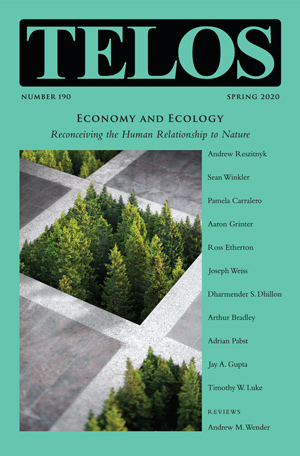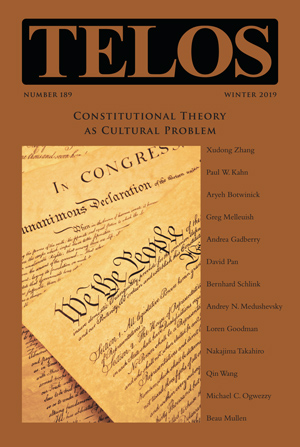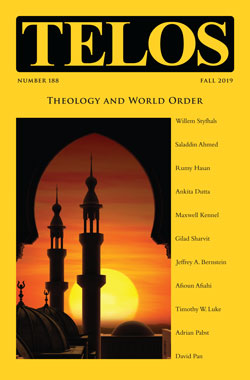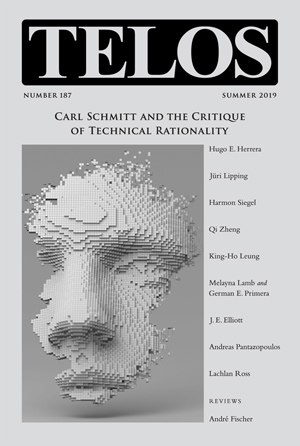By Aaron Grinter · Thursday, April 16, 2020 Aaron Grinter’s “Metaphors in Science: Lessons for Developing an Ecological Paradigm” appears in Telos 190 (Spring 2020): Economy and Ecology: Reconceiving the Human Relationship to Nature. Read the full article at the Telos Online website, or purchase a print copy of the issue in our online store. Individual subscriptions to Telos are available in both print and online formats.
 The scientific method seems familiar to most, but an important element of this practice is often overlooked: the metaphor. This article explores the role played by metaphors in the conception and experimentation of scientific hypotheses, and the extent to which the process of metaphorical consideration is founded in imagination and creativity. With positivistic and reductionist traditions coming to prominence within scientific disciplines, there is emerging a corresponding lack of imagination and increased dislocation from the natural processes being studied. Using the complex process logic involved in metaphorical understanding, the task will be to develop a new paradigm to break out of these stifling traditions, one that has the potential to consider the complex holistic interrelations of the biosphere. As the epoch of the Anthropocene becomes more inculcated in contemporary culture, there has never been a more important time to reassess our relationship to, and position within, the natural world. The scientific method seems familiar to most, but an important element of this practice is often overlooked: the metaphor. This article explores the role played by metaphors in the conception and experimentation of scientific hypotheses, and the extent to which the process of metaphorical consideration is founded in imagination and creativity. With positivistic and reductionist traditions coming to prominence within scientific disciplines, there is emerging a corresponding lack of imagination and increased dislocation from the natural processes being studied. Using the complex process logic involved in metaphorical understanding, the task will be to develop a new paradigm to break out of these stifling traditions, one that has the potential to consider the complex holistic interrelations of the biosphere. As the epoch of the Anthropocene becomes more inculcated in contemporary culture, there has never been a more important time to reassess our relationship to, and position within, the natural world.
Continue reading →
By Arthur Bradley · Wednesday, April 1, 2020 Arthur Bradley’s “Terrors of Theory: Critical Theory of Terror from Kojève to Žižek” appears in Telos 190 (Spring 2020): Economy and Ecology: Reconceiving the Human Relationship to Nature. Read the full article at the Telos Online website, or purchase a print copy of the issue in our online store. Individual subscriptions to Telos are available in both print and online formats.
 This essay seeks to offer a new genealogy of contemporary critical theory of terror from Alexandre Kojève to Slavoj Žižek. It is clear that critical theory’s response to the volatile post-9/11 geopolitical landscape takes many forms, but one of its most controversial tasks has been a reclamation of the fatal signifier “terror” itself for the radical Left. According to thinkers such as Žižek and Alain Badiou, we must redeem the emancipatory core of the Jacobin Terror from its “Thermodorean” betrayal by two centuries of political and economic liberalism. Yet my claim is that this critical attempt to recuperate terrorism can only be understood in the context of a much longer debate about the meaning of “terror” within twentieth-century European philosophy, which stretches back to Kojève’s lectures on Hegel in the 1930s. This essay tracks the evolution of critical theory of terror from Kojève’s political ontology of terror in his (famously or notoriously) idiosyncratic interpretation of the Hegelian master–slave dialectic to its contemporary conclusion in Žižek’s embrace of Jacobin terror. If Kojève’s lectures effectively introduced Hegel into twentieth-century European philosophy, I will argue that they were also the platform for a wave of neo-Hegelian reflections on the historical, political, and philosophical stakes of terror including, most importantly, Emmanuel Lévinas’s Time and the Other (1947) and Maurice Blanchot’s “Literature and the Right to Death” (1949). In conclusion, I contend that Žižek’s neo-Hegelian defense of the Jacobin leader Robespierre in recent works like In Defense of Lost Causes (2008) might, for better or worse, be read as the latest manifestation of this Kojèvean terrorist legacy. This essay seeks to offer a new genealogy of contemporary critical theory of terror from Alexandre Kojève to Slavoj Žižek. It is clear that critical theory’s response to the volatile post-9/11 geopolitical landscape takes many forms, but one of its most controversial tasks has been a reclamation of the fatal signifier “terror” itself for the radical Left. According to thinkers such as Žižek and Alain Badiou, we must redeem the emancipatory core of the Jacobin Terror from its “Thermodorean” betrayal by two centuries of political and economic liberalism. Yet my claim is that this critical attempt to recuperate terrorism can only be understood in the context of a much longer debate about the meaning of “terror” within twentieth-century European philosophy, which stretches back to Kojève’s lectures on Hegel in the 1930s. This essay tracks the evolution of critical theory of terror from Kojève’s political ontology of terror in his (famously or notoriously) idiosyncratic interpretation of the Hegelian master–slave dialectic to its contemporary conclusion in Žižek’s embrace of Jacobin terror. If Kojève’s lectures effectively introduced Hegel into twentieth-century European philosophy, I will argue that they were also the platform for a wave of neo-Hegelian reflections on the historical, political, and philosophical stakes of terror including, most importantly, Emmanuel Lévinas’s Time and the Other (1947) and Maurice Blanchot’s “Literature and the Right to Death” (1949). In conclusion, I contend that Žižek’s neo-Hegelian defense of the Jacobin leader Robespierre in recent works like In Defense of Lost Causes (2008) might, for better or worse, be read as the latest manifestation of this Kojèvean terrorist legacy.
Continue reading →
By Sean Winkler · Tuesday, March 24, 2020 Sean Winkler’s “Practice and Ideology in Boris Hessen’s ‘The Social and Economic Roots of Newton’s Principia’” appears in Telos 190 (Spring 2020): Economy and Ecology: Reconceiving the Human Relationship to Nature. Read the full article at the Telos Online website, or purchase a print copy of the issue in our online store. Individual subscriptions to Telos are available in both print and online formats.
 In this paper, I examine the meaning of and relationship between “practice” and “ideology” in Boris Hessen’s “The Social and Economic Roots of Newton’s Principia.” I propose that for Hessen, practice can be defined as the transformation of things-in-themselves into things-for-us, as well as the transformation of things-in-themselves into things-for-themselves. Ideology, for Hessen, refers to the specific difference between practice and theory, when the practical roots of theory are concealed. In section 1, I explain the Hessen theses and identify means and relations of production as the two kinds of practice presented in the Newton paper. In section 2, I trace the history of the composition and reception of the Hessen theses, showing that any attempt to understand practice and ideology in Hessen’s work requires incorporating his not only Marxist but Deborinite background. In section 3, I explain conceptions of practice and ideology from previous Marxist thinkers and how Hessen, as a Deborinite, may have integrated aspects of these conceptions into his own view. In section 4, I show that Nikolai Bukharin’s “Theory and Practice from the Standpoint of Dialectical Materialism” provides the proper complement for understanding the remaining elements of Hessen’s account. In this paper, I examine the meaning of and relationship between “practice” and “ideology” in Boris Hessen’s “The Social and Economic Roots of Newton’s Principia.” I propose that for Hessen, practice can be defined as the transformation of things-in-themselves into things-for-us, as well as the transformation of things-in-themselves into things-for-themselves. Ideology, for Hessen, refers to the specific difference between practice and theory, when the practical roots of theory are concealed. In section 1, I explain the Hessen theses and identify means and relations of production as the two kinds of practice presented in the Newton paper. In section 2, I trace the history of the composition and reception of the Hessen theses, showing that any attempt to understand practice and ideology in Hessen’s work requires incorporating his not only Marxist but Deborinite background. In section 3, I explain conceptions of practice and ideology from previous Marxist thinkers and how Hessen, as a Deborinite, may have integrated aspects of these conceptions into his own view. In section 4, I show that Nikolai Bukharin’s “Theory and Practice from the Standpoint of Dialectical Materialism” provides the proper complement for understanding the remaining elements of Hessen’s account.
Continue reading →
By Andrey N. Medushevsky · Thursday, January 2, 2020 Andrey N. Medushevsky’s “Law and Revolution: The Impact of Soviet Legitimacy on Post-Soviet Constitutional Transformation” appears in Telos 189 (Winter 2019), a special issue on constitutional theory. Read the full article at the Telos Online website, or purchase a print copy of the issue in our online store. Individual subscriptions to Telos are available in both print and online formats.
 The systematic investigation of the Russian revolutionary tradition in comparative, historical, and functional perspective provides the opportunity to understand its impact on the creation of the modern world and the contemporary social and political system. This article discusses the meaning, formation, and evolution of the Soviet project—the concept and practice of social and legal reorganization in Russia inspired by Marxist philosophical ideas and fulfilled during the period from the Bolshevik Revolution of 1917 until the collapse of the Soviet regime in 1991. Employing a cognitive theoretical approach in historical studies, the author examines the role of Communist myth in the formation of the Soviet state, the ideological and legal grounds of one-party dictatorship, the nature of nominal constitutionalism, and the role of institutional continuity in the formation of the current political system. He shows the place of the permanent grounds (ideology, nominal constitutionalism, and dictatorial impetus) as well as the place of changing parameters of the project (Soviet, federative, and class-oriented regulation) regarding their formal and informal influence on the political regime’s legitimacy and the cumulative impact on the system’s transformation and failure. In this context, the author discusses the evolution of the legitimating formula of the political regime from Tsarist times to the collapse of the Soviet regime, as represented in ideological programmatic, nominal Soviet constitutionalism (1918, 1924, 1936, and 1977 Soviet constitutions) and changing practices of the social mobilization. That makes possible the general evaluation of the revolutionary heritage and its influence on the current post-Soviet ideological priorities, political system, legal transformation, and prospects for its modernization. The systematic investigation of the Russian revolutionary tradition in comparative, historical, and functional perspective provides the opportunity to understand its impact on the creation of the modern world and the contemporary social and political system. This article discusses the meaning, formation, and evolution of the Soviet project—the concept and practice of social and legal reorganization in Russia inspired by Marxist philosophical ideas and fulfilled during the period from the Bolshevik Revolution of 1917 until the collapse of the Soviet regime in 1991. Employing a cognitive theoretical approach in historical studies, the author examines the role of Communist myth in the formation of the Soviet state, the ideological and legal grounds of one-party dictatorship, the nature of nominal constitutionalism, and the role of institutional continuity in the formation of the current political system. He shows the place of the permanent grounds (ideology, nominal constitutionalism, and dictatorial impetus) as well as the place of changing parameters of the project (Soviet, federative, and class-oriented regulation) regarding their formal and informal influence on the political regime’s legitimacy and the cumulative impact on the system’s transformation and failure. In this context, the author discusses the evolution of the legitimating formula of the political regime from Tsarist times to the collapse of the Soviet regime, as represented in ideological programmatic, nominal Soviet constitutionalism (1918, 1924, 1936, and 1977 Soviet constitutions) and changing practices of the social mobilization. That makes possible the general evaluation of the revolutionary heritage and its influence on the current post-Soviet ideological priorities, political system, legal transformation, and prospects for its modernization.
Continue reading →
By Maxwell Kennel · Friday, November 15, 2019 Maxwell Kennel’s “Periodization and Providence: Time and Eternity between Nietzsche’s Zarathustra and Augustine’s Confessions” appears in Telos 188 (Fall 2019). Read the full article at the Telos Online website, or purchase a print copy of the issue in our online store. Individual subscriptions to Telos are available in both print and online formats.
 In order to address the politics of temporal regulation and periodization, while considering ways in which competing religious and secular narratives construct contemporary subjectivity, this article compares the quasi-autobiographical narratives of Friedrich Nietzsche’s Thus Spoke Zarathustra and Saint Augustine’s Confessions. Looking beneath the surface differences between these two works, this study draws out surprising affinities and continuities between Zarathustra and the Confessions and compares each work’s vision of time and eternity. By examining Zarathustra’s parable of the gate and its punctuating moment (Augenblick) alongside Augustine’s notion of the distentio animi in book 11 of the Confessions, this article questions competing Christian and anti-Christian narratives and their use of teleology and providence in the periodization of time, and concludes by contesting these narratives from the standpoint of postsecular critique. In order to address the politics of temporal regulation and periodization, while considering ways in which competing religious and secular narratives construct contemporary subjectivity, this article compares the quasi-autobiographical narratives of Friedrich Nietzsche’s Thus Spoke Zarathustra and Saint Augustine’s Confessions. Looking beneath the surface differences between these two works, this study draws out surprising affinities and continuities between Zarathustra and the Confessions and compares each work’s vision of time and eternity. By examining Zarathustra’s parable of the gate and its punctuating moment (Augenblick) alongside Augustine’s notion of the distentio animi in book 11 of the Confessions, this article questions competing Christian and anti-Christian narratives and their use of teleology and providence in the periodization of time, and concludes by contesting these narratives from the standpoint of postsecular critique.
Continue reading →
By J. E. Elliott · Thursday, August 1, 2019 J. E. Elliott’s “Insourcing Dissent: Brand English in the Entrepreneurial University” appears in Telos 187 (Summer 2019). Read the full article at the Telos Online website, or purchase a print copy of the issue in our online store. Individual subscriptions to Telos are available in both print and online formats.
 This essay addresses the emergence of dissent culture as a hallmark of teaching and research in English studies and the humanities more generally in the time and temper of the commercial-bureaucratic university. I argue that the most convincing explanation for the widespread adoption of a protest ethos in an institution ostensibly opposed to its prescriptions is not a paradigm shift from formalist to political approaches to texts and artifacts, much less principled opposition to late Western capitalism or technological reason, but a reproduction of the routines, scripts, norms, and values of American higher education as an entrepreneurial enterprise. Dissent, in other words, is an organizationally conservative force: it animates disciplinary alternatives to STEM and business curricula while articulating a remedial narrative of inclusiveness (“diversity”) that bears witness to American higher education’s residual commitments to political engagement and democracy building. This insourcing of protest has assured English studies’ viability in the corporate university by reconfiguring the discipline as an academic brand alongside Brand Science and Brand Business in the organizational field of the university. To the extent that the politics of advocating for the disempowered and marginalized is an in-house creation without demonstrable political or policy-related impact, however, dissent culture can also be read as a reflexive (and symptomatic) protest against its own institutional capture. The essay concludes with a discussion of prospective alterations to Brand English in light of recent developments in the digital humanities. This essay addresses the emergence of dissent culture as a hallmark of teaching and research in English studies and the humanities more generally in the time and temper of the commercial-bureaucratic university. I argue that the most convincing explanation for the widespread adoption of a protest ethos in an institution ostensibly opposed to its prescriptions is not a paradigm shift from formalist to political approaches to texts and artifacts, much less principled opposition to late Western capitalism or technological reason, but a reproduction of the routines, scripts, norms, and values of American higher education as an entrepreneurial enterprise. Dissent, in other words, is an organizationally conservative force: it animates disciplinary alternatives to STEM and business curricula while articulating a remedial narrative of inclusiveness (“diversity”) that bears witness to American higher education’s residual commitments to political engagement and democracy building. This insourcing of protest has assured English studies’ viability in the corporate university by reconfiguring the discipline as an academic brand alongside Brand Science and Brand Business in the organizational field of the university. To the extent that the politics of advocating for the disempowered and marginalized is an in-house creation without demonstrable political or policy-related impact, however, dissent culture can also be read as a reflexive (and symptomatic) protest against its own institutional capture. The essay concludes with a discussion of prospective alterations to Brand English in light of recent developments in the digital humanities.
Continue reading →
|
|
 The scientific method seems familiar to most, but an important element of this practice is often overlooked: the metaphor. This article explores the role played by metaphors in the conception and experimentation of scientific hypotheses, and the extent to which the process of metaphorical consideration is founded in imagination and creativity. With positivistic and reductionist traditions coming to prominence within scientific disciplines, there is emerging a corresponding lack of imagination and increased dislocation from the natural processes being studied. Using the complex process logic involved in metaphorical understanding, the task will be to develop a new paradigm to break out of these stifling traditions, one that has the potential to consider the complex holistic interrelations of the biosphere. As the epoch of the Anthropocene becomes more inculcated in contemporary culture, there has never been a more important time to reassess our relationship to, and position within, the natural world.
The scientific method seems familiar to most, but an important element of this practice is often overlooked: the metaphor. This article explores the role played by metaphors in the conception and experimentation of scientific hypotheses, and the extent to which the process of metaphorical consideration is founded in imagination and creativity. With positivistic and reductionist traditions coming to prominence within scientific disciplines, there is emerging a corresponding lack of imagination and increased dislocation from the natural processes being studied. Using the complex process logic involved in metaphorical understanding, the task will be to develop a new paradigm to break out of these stifling traditions, one that has the potential to consider the complex holistic interrelations of the biosphere. As the epoch of the Anthropocene becomes more inculcated in contemporary culture, there has never been a more important time to reassess our relationship to, and position within, the natural world. 




